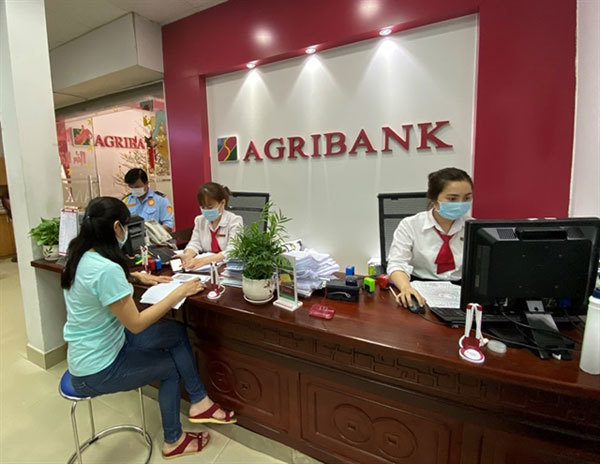 |
| A customer at a branch of Agribank in Hanoi. VNBA proposed the State Bank amend Circular No 3 in order to help their clients affected by the COVID-19 pandemic. — Photo courtesy of Agribank |
The 4th wave of COVID-19 has spread to many provinces and cities, seriously affecting production businesses and people. Many big cities and provinces, including HCM City and Hanoi, are applying strict social distancing measures with some areas even locked down, to curb the spread of the virus amid the worsening COVID-19 situation.
VNBA proposed the State Bank amend Circular No 3, allowing customers of banks, whose debts are due during the mandatory quarantine period, to delay the repayment of due debt amounts after the maturity date, with no fees or penalties being charged during the delay.
Circular No 03/2021/TT-NHNN dated April 2, 2021 of the State Bank of Vietnam gives exemptions from or reductions in loan interest and charges, and maintains classified loan groups in order to help clients affected by the COVID-19 pandemic.
There were cases where a customer was unable to repay the debt and was forced to restructure his debt, but he was stuck in a locked-down area, so he was unable to go to the bank to complete procedures, said VNBA.
Under the current regulations, these cases must still be classified as a “riskier” group of debts, affecting the reputation of customers featured on the National Credit Information Center (CIC), besides the debt quality of credit institutions, it said.
“Bank for Agriculture and Rural Development of Vietnam (Agribank) is also facing the risk of bad debt increasing and it is difficult to keep overall bad debt ratio below two per cent as planned,” Pham Toan Vuong, Deputy General Director of the bank, told Việt Nam News Agency.
“In order to support customers, Agribank has proactively reported to the State supervisory agencies about cases where customers are stuck in locked-down areas during the quarantine period. The bank also does not collect overdue interest during the period. At the same time, it gives customers guidance on procedures for debt restructuring via online platforms such as Zalo and Viber,” he said.
Nguyen Quoc Hung, VNBA General Secretary, said the State Bank should consider amending Circular 03 and have appropriate solutions to support banks in the context of the COVID-19 pandemic.
“Amending Circular 03 is an urgent task to ensure a legal corridor for credit institutions to support customers affected by the COVID-19 pandemic, especially regulations on debt restructuring, who are subject to debt restructuring, allowing credit institutions to proactively restructure debts," Hung said.
Nguyen Canh Vinh, Acting General Director of Vietnam Export-Import Commercial Joint Stock Bank (Eximbank), said: “It is necessary to quickly adjust Circular 03 because the situation is increasingly complicated. In some cities such as Nha Trang and Hoi An, 80 per cent of Eximbank's customers have had to restructure their debts. Without timely solutions, these debts will become bad debts.
“The State Bank should also study a clear formula for risk provisioning. The number of loans affected by COVID-19 may increase further due to its complex development, affecting banks’ resources, causing undesired mistakes and errors in calculation.
“The State Bank should study and apply a simple, easy-to-use provision formula or provide detailed instructions to limit errors for credit institutions in setting up provisions in order to assist them to give maximum support for customers,” he said.
According to data of BOS Securities Joint Stock Company, total value of bad debts of 24 listed banks reached VND91.24 trillion (US$3.9 billion) by the end of the first quarter, an increase of VND3.95 trillion compared to the end of 2020. The ratio of bad debt to total outstanding loans also increased by 0.02 percentage points to 1.41 per cent.
Source: Vietnam News

Solutions proposed to handle bad debts amid COVID-19 pandemic
Bad debts may climb by the end of the year as the pandemic has interrupted the production of many enterprises and they had no revenue to repay debts.